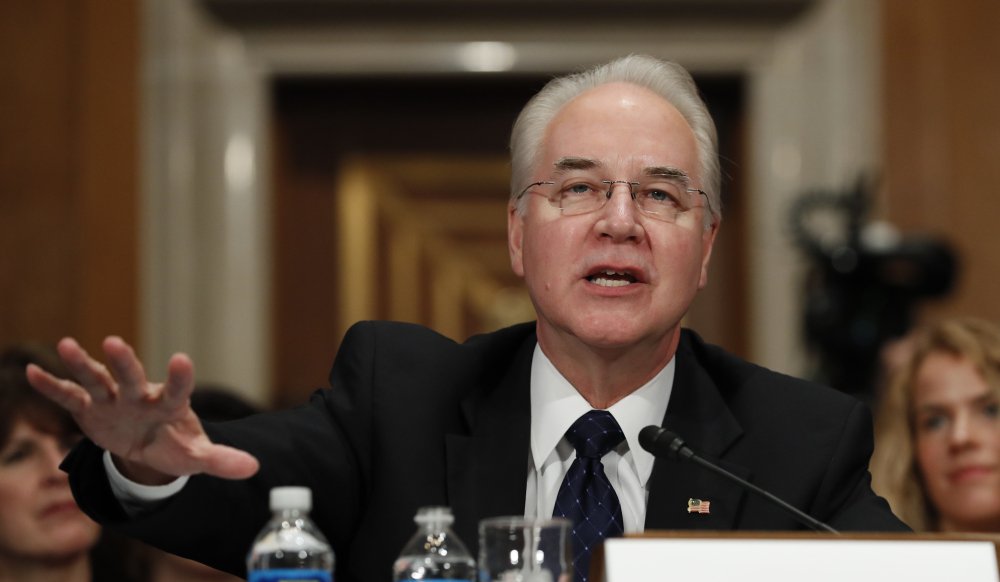WASHINGTON — Rep. Tom Price, President-elect Donald Trump’s choice to head the Department of Health and Human Services, faced a contentious Senate hearing Wednesday as lawmakers questioned his plan to protect Americans’ health coverage and whether his personal investments in health-care companies presented conflicts during his years in Congress.
Democrats on the Senate Health, Education, Labor and Pensions Committee grilled Price, R-Ga., over his stock transactions in health, biomedical and pharmaceutical companies while he was supporting legislation that could benefit them.
The half-day hearing was one of four held Wednesday by Senate committees on the president-elect’s Cabinet choices. The generally genial sessions with billionaire investor Wilbur Ross, Trump’s pick to head the Commerce Department, and South Carolina Gov. Nikki Haley (R), his selection for U.N. ambassador, contrasted with the more confrontational questioning of Price and Scott Pruitt, the Oklahoma attorney general, who is in line to lead the Environmental Protection Agency in a Trump administration.
DEMOCRATS PRESS HARD
In Price’s case, Democrats, who have called for ethics investigations, pressed hard on whether he used insider knowledge to enrich himself or pushed bills benefiting companies in which he had invested. Some exchanges were particularly sharp: Sen. Elizabeth Warren, D-Mass., lectured Price so persistently on his stock trading that he declared himself “offended.”
The nominee maintained that he had not sought to take advantage of his public position and that he was not aware of what precise stocks he held in the past or at present. “Everything that we have done has been aboveboard, ethical, transparent and legal,” he said.
He denied the existence of any conflict stemming from stock purchases, saying he’d had “no conversations with my broker about any political activity at all, other than her congratulating me on my election.”
Price began by laying out central elements of his years-long attempt to replace the Affordable Care Act along conservative lines.
In doing so, he signaled ways in which Trump’s more populist message could collide with the core beliefs of congressional Republicans. He told senators that “it is absolutely imperative” for the government to ensure that all Americans “have the opportunity to gain access” to insurance coverage – a more modest goal than the “insurance for everybody” declaration that the incoming president made this past weekend.
And Price expressed views that go beyond those articulated by the president he would serve, such as requiring some Medicaid recipients to work as a condition of their benefits and not guaranteeing that young adults can stay on their parents’ health plans until age 26.
FORMAL HEARING ON TUESDAY
The courtesy hearing before the Senate panel marked the first time Price had appeared before lawmakers since his selection by Trump. His formal confirmation hearing before the Senate Finance Committee is set for Tuesday.
The committee’s chairman, Sen. Lamar Alexander, R-Tenn., and top Democrat, Sen. Patty Murray (Wash.), made clear they were searching for more specific details on plans to replace the ACA.
Alexander began the hearing by reading conflicting comments by Trump, House Speaker Paul Ryan, R-Wis., and Senate Majority Leader Mitch McConnell, R-Ky., about how they planned to replace the 2010 law “simultaneously,” “concurrently” and in “manageable pieces.”
“Trying to interpret what those words mean, to me, that means Obamacare should be finally repealed only when there are concrete practical reforms in place to give Americans access to truly affordable health care,” he said. “It’s not about developing a quick fix.”
Murray criticized Republicans for “rushing” the confirmation process and told the nominee that she had “serious concerns about your qualifications and plans for the department you hope to lead.”
Price’s financial dealings attracted as much attention as his policy positions Wednesday.
In December, the Wall Street Journal reported that since 2012, Price had traded more than $300,000 in shares in about 40 health, biomedical and pharmaceutical companies while he was involved with legislation that might affect those firms’ stocks.
Three such trades involved drugmakers Amgen, Eli Lilly and Bristol-Myers Squibb, which stood to receive massive tax breaks under a bill that Price later introduced in Congress.
The bill, which did not pass, sought a permanent tax break for American businesses with manufacturing and other production activities based in Puerto Rico. All three of those pharmaceutical companies have production facilities in Puerto Rico.
Send questions/comments to the editors.



Success. Please wait for the page to reload. If the page does not reload within 5 seconds, please refresh the page.
Enter your email and password to access comments.
Hi, to comment on stories you must . This profile is in addition to your subscription and website login.
Already have a commenting profile? .
Invalid username/password.
Please check your email to confirm and complete your registration.
Only subscribers are eligible to post comments. Please subscribe or login first for digital access. Here’s why.
Use the form below to reset your password. When you've submitted your account email, we will send an email with a reset code.